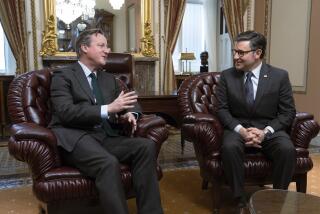Britain’s Major to Iron Things Out With Clinton--in Pittsburgh
- Share via
WASHINGTON — The special relationship between the United States and Britain, dented by collisions over Bosnia and Northern Ireland, will undergo some repairs next week in the unlikely venue of Pittsburgh.
At President Clinton’s invitation, British Prime Minister John Major will join him on a trip to the Monongahela Valley region of Pennsylvania, where Major’s grandfather helped build steel-mill blast furnaces in the 1870s. Then the pair will return to Washington, where Major will spend a night at the White House--a rare honor for a foreign head of state.
This attention comes amid public declarations from the White House and the Major administration that there are no tensions between the two countries.
“It is not a strained relationship,” White House Press Secretary Dee Dee Myers insisted this week. “Any reports to the contrary are . . . simply not true.”
But many analysts remain unconvinced, believing that the two leaders are trying to rebuild what--since the unexpected recent strengthening of U.S.-French ties--has become the coolest of America’s relationships with its major Western European allies.
A warming could help Clinton in Bosnia, where the British have been among the most resistant to U.S. efforts to use the threat of force to bring peace.
Signs of new respect from Clinton could also revitalize Major’s sagging popularity.
While arrangements are incomplete, the Pittsburgh trip is expected to focus on the economic revitalization of an old-line industrial area that--like many in England--has been hard hit by the loss of high-paying manufacturing jobs.
Relations between Clinton and Major were once expected to be good, because both came from humble backgrounds.
But earlier this year, one U.S. official described the chemistry between the gregarious Clinton and the stolid Major--sometimes called “Mister Gray”--as “non-existent.”
While the tensions have received far less attention here, many in the United Kingdom have been alarmed by an apparent series of conflicts between the White House and Downing Street.
Clinton’s decision to grant a visa to Gerry Adams, leader of the political arm of the Irish Republican Army, provoked angry and hurt reactions from the British.
Clinton secured Major’s agreement to support a NATO ultimatum to the Bosnian Serbs only by warning that disunity would weaken the Western alliance. And the two administrations have been at odds over other issues, including the plan to gradually expand NATO’s membership and the U.S. government’s more aggressive intervention in trade matters.
More to Read
Sign up for Essential California
The most important California stories and recommendations in your inbox every morning.
You may occasionally receive promotional content from the Los Angeles Times.













